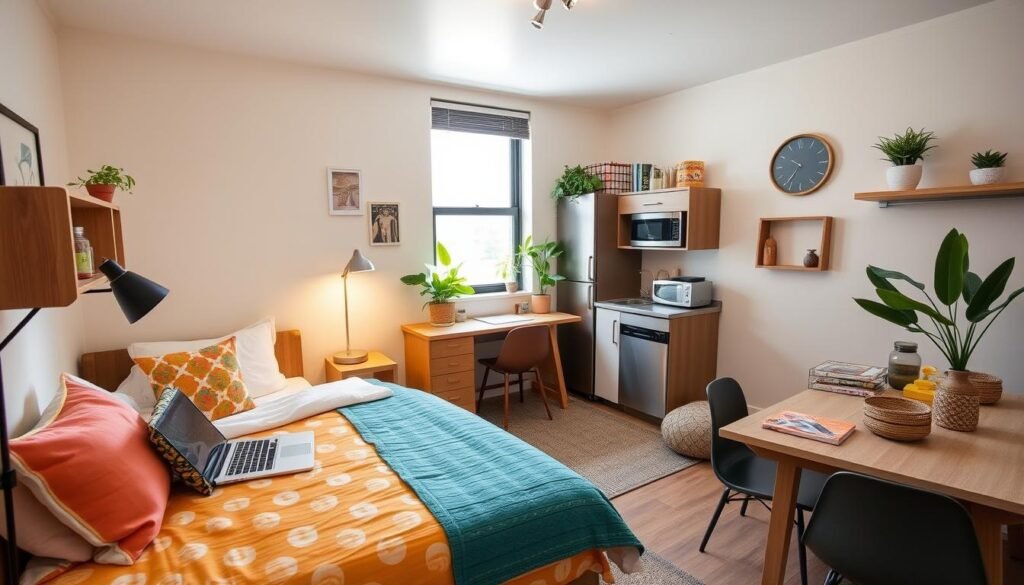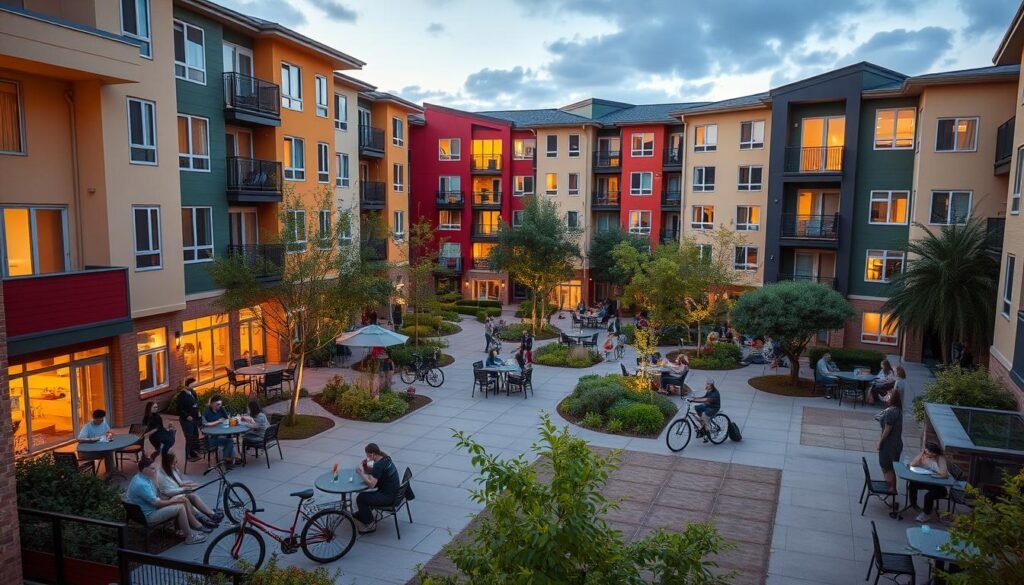Finding the right student housing can be tough. But it’s key to a great college experience. The right place to live can boost your grades, friendships, and personal growth. This guide will help you find affordable and comfy housing that makes your college years better.
Key Takeaways
- Understand the benefits and drawbacks of on-campus and off-campus housing options
- Learn strategies for creating a realistic housing budget and managing hidden costs
- Explore essential amenities and features to look for in student housing
- Navigate the student housing application process with confidence
- Discover how location can impact student success and campus community
Understanding Student Housing Options and Benefits
When looking for student housing, you have a few main choices: on-campus dorms, off-campus apartments, townhouses, and shared living spaces. Each choice has its own benefits and downsides. It’s important to think about what matters most to you.
On-Campus Housing Benefits
Living in dormitories on campus means easy access to classes and campus resources. You also get utilities and meal plans, making budgeting simpler. But, on-campus spots are limited, and competition is fierce.
Off-Campus Living Advantages
Choosing an off-campus apartment might save you money and give you more privacy. With more student apartments and townhouses available, you have lots of options. But, you’ll have to handle rent, utilities, and upkeep yourself.
Comparing Costs and Value
When picking housing, look at the total housing costs, including rent, utilities, and extra fees. Living with roommates or in Greek life housing can cut costs. For international students, homestay with a host family might be cheaper. Finding the right mix of cost, amenities, and personal preference is key to affordable and comfortable housing.
Location Strategies for Student Success

Location is key for student success in housing. Being close to campus, having good public transport, and access to shops and libraries matter a lot. These factors greatly affect a student’s life.
Living near the campus saves time and reduces stress. It lets students focus better on their studies. Many like places within walking distance or near public transport. This gives them freedom and independence.
But, it’s not just about being close to campus. Safety and quiet of the area are also crucial. A peaceful and safe place helps with better sleep, mental health, and study focus.
Students must balance location with their budget. Finding the right place is about making smart choices. This helps them succeed in their studies.
| Metric | University of Houston | Keene State College | Tecnológico de Monterrey |
|---|---|---|---|
| Housing Bed Capacity | 8,397 | N/A | N/A |
| Residential Students’ GPA | 2.90 | N/A | N/A |
| Credit Hours Completed | 4.39 more per year | N/A | N/A |
| 4-Year Graduation Rate | 41.23% | N/A | N/A |
| 5-Year Graduation Rate | 61.12% | N/A | N/A |
| 6-Year Graduation Rate | 37.80% | N/A | N/A |
The table shows how living on campus helps students. At the University of Houston, students living on campus do better. They have higher GPAs, complete more credits, and graduate more often than those commuting.
Thinking carefully about where to live can greatly benefit students. It helps them achieve their academic goals and succeed in the long run.
“Creating culturally competent spaces within residence halls, integrating diverse aesthetics and gender-neutral facilities, fosters inclusivity and a sense of belonging for students from various backgrounds.”
Budget Planning and Financial Considerations

Managing your money as a student can seem tough. But with good planning and budgeting, you can meet your housing needs. Start by making a housing budget that includes rent, utilities, food, transportation, and other costs.
Creating a Realistic Housing Budget
When making your housing budget, think about your income. This could be from part-time jobs, scholarships, or financial aid. The 50/30/20 rule is a good guide. It suggests spending 50% on needs, 30% on wants, and 20% on savings and goals. This helps you manage your spending and keep housing costs low.
Hidden Costs to Consider
There are hidden costs for student housing, like security deposits and application fees. First-year students spend about $1,212 on books and supplies. College meal plans can cost around $4,500 a year. Make sure to include these in your budget.
Financial Aid and Housing Assistance
There are many ways to get help with housing costs. Look into scholarships, grants, and university resources. Some schools even have housing assistance programs to help with expenses.
By planning your budget well, knowing about hidden costs, and using financial aid, you can afford student housing. With effort, you can balance paying your rent and covering other essential costs.
| Expense | Average Cost |
|---|---|
| Tuition and Fees | $25,000 |
| Room and Board | $12,000 |
| Books and Supplies | $1,200 |
| Transportation | $2,000 |
| Personal Expenses | $3,000 |
| Total | $43,200 |
“The typical student budget in the United States is $15,000 per year, covering tuition fees, room and board, transportation, textbooks, and other living expenses.”
Essential Amenities and Features to Look For

When looking for student housing, focus on amenities that fit your lifestyle and study needs. High-speed wi-fi is key for online classes and research. Look for study spaces with lots of outlets, comfy seats, and 24/7 access for the best study environment.
Having easy access to laundry facilities is also important. Choose places with enough laundry machines and extras like fabric softener. Fully furnished options can also save you money and time on buying furniture.
- Secure package management system with smart access for deliveries
- Smart temperature control through programmable thermostats
- Communal spaces for socializing and community-building events
- Fitness center or gym to promote physical activity and well-being
- Outdoor amenities like recreational areas and study spaces
- Ample parking or proximity to public transportation
By looking at these amenities and features, you can find housing that supports your studies and well-being. Focus on the essentials that help you succeed and feel good.
| Amenity | Importance | Benefit |
|---|---|---|
| High-speed wi-fi | Crucial | Enables online coursework and research |
| Dedicated study spaces | Essential | Provides a quiet, comfortable environment for productivity |
| Convenient laundry facilities | Necessary | Reduces the time and effort needed for laundry tasks |
| Fully furnished options | Beneficial | Saves money and time on purchasing furniture and appliances |
| Fitness center or gym | Advantageous | Promotes physical activity and overall well-being |
The right mix of amenities and features can greatly improve your student housing experience. It supports your studies and enhances your life quality.
Navigating the Student Housing Application Process
Looking for student housing can be both thrilling and challenging. Start your search 6-8 months before you plan to move in. This gives you enough time to look at options, fill out applications, and find your ideal place.
Application Timeline Tips
First, check the application deadlines for both on-campus and off-campus housing. Universities often give priority to early applicants. Make a timeline for yourself to keep track of deadlines, deposits, and any extra documents you might need.
Required Documentation
When you apply for housing, you’ll need to provide several documents. These might include proof of enrollment, financial info, and ID. Make sure you have these ready to avoid delays. If you’re under 18, your parent or guardian must sign the agreement online.
Understanding Housing Contracts
Read any housing contracts carefully before signing. Look for important details like the lease length, payment schedule, and rules about guests or changes. If you have questions, contact the housing office. Knowing what you’re agreeing to helps you make a good choice and avoid surprises.
Also Read : University Entrance Exams: Your Path To Higher Education
FAQs
Q: What are the different student housing options available at [Your University Name]?
A: At [Your University Name], students can choose from various housing options, including on-campus residence halls and off-campus student apartments. Residence halls provide a community living experience, while student apartments located within close proximity to campus offer more independence.
Q: How can I find student housing for the 2024 academic year?
A: To find student housing for the 2024 academic year, you can start by visiting the university’s housing website. This site includes listings for both on-campus housing and off-campus student apartments, along with details on the housing application process.
Q: Are there fully furnished student apartments available for international students?
A: Yes, there are fully furnished student apartments available for international students. These apartments are designed to provide a comfortable living experience and come equipped with essential amenities such as wi-fi and kitchen appliances.
Q: What is the move-in process for on-campus housing?
A: The move-in process for on-campus housing involves several steps, including completing the housing application, paying any required fees, and scheduling a move-in date. Most students will receive detailed instructions via their student account prior to their move-in.
Q: Is it required to live on campus during the first year?
A: Many universities, including [Your University Name], require first-year students to live on campus. This policy is designed to promote student success and help new students integrate into the campus community.
Q: How can I pay for housing costs while attending [Your University Name]?
A: Students can pay for housing costs using various methods, including financial aid to pay for housing, scholarships, or personal funds. Students may also need a guarantor to secure off-campus housing agreements.
Q: What amenities are included in the student housing offered?
A: The student housing offered at [Your University Name] typically includes amenities such as furnished living spaces, wi-fi, laundry facilities, and access to dining services. Specific amenities may vary between residence halls and student apartments.
Q: Can I get a refund if I withdraw from my housing agreement?
A: Refund policies for housing agreements vary and are typically outlined in the housing application process. If you withdraw from your housing agreement, please contact the housing office to discuss potential refunds and any associated penalties.
Q: How does living on campus enhance the college experience?
A: Living on campus enhances the college experience by providing opportunities for social interaction, easy access to campus resources, and a supportive community. Students who live on campus often find it easier to engage in campus activities and build lasting friendships.
Source Links
- https://www.pennilessparenting.com/2024/05/student-accommodations-on-budget.html
- https://regentstudents.com/blog/the-ultimate-guide-to-finding-affordable-student-housing/
- https://www.affordablecollegesonline.org/college-resource-center/college-housing-survival-guide/
- tml

